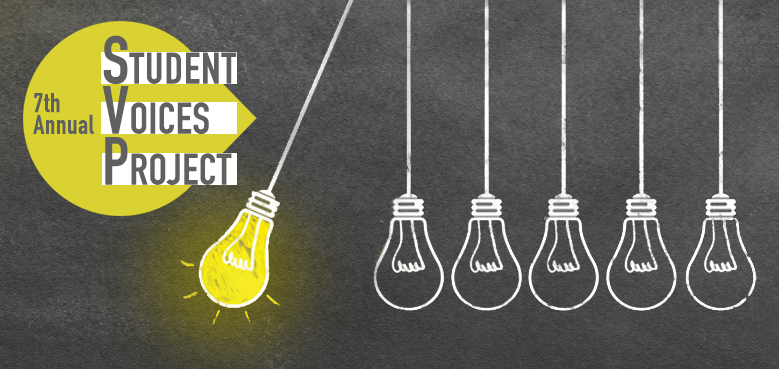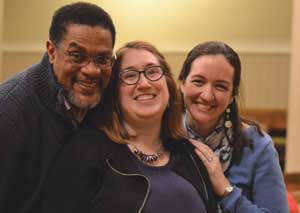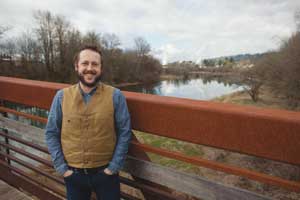
Fast Facts:
- Must be a middle or high school student (grades 6–12) at a Friends school, or a Quaker student in another educational venue (public school, non-Friends private school, homeschool, online school, etc.) with a Quaker affiliation (monthly or yearly meeting attender or member, including young Friends gatherings and Quaker camps).
- One submission per student, connected to the theme of “Creating Change.”
- Must have an original title, and it must be typed.
- Word count: between 300 and 1,500 words.
- Submissions close February 10, 2020. (Ready? Submit here)
- Questions? Email gail@friendsjournal.org.
The seventh annual Student Voices Project is underway, and this year we’re asking students to write about creating change in their communities. We landed on this theme of “change” after having a few conversations with other Quakers about it. The first was a meeting with the go-to organization for all things related to Friends school education: Friends Council on Education, and the second was with someone in the target demographic: a young Friend and senior at George School in Newtown, Pa., who was serving as an intern with us at the time. As manager of the project, I seek to gather feedback and brainstorm new ideas every year so we can increase and improve student participation.
Deborra Sines Pancoe, associate director of Friends Council, and I met at a coffeeshop in August to talk about this year’s project. Friends Council has been supporting the project since its beginning in 2013: by providing feedback on themes and presentation, by helping to get the word out every year, and by formally recognizing the student honorees for their published work. At our meeting, Deborra brought a story to my attention: a middle school group at Greene Street Friends School in Philadelphia had connected with a refugee family in their neighborhood through the local sanctuary church. The students had asked the church how they could help one of the families staying there and ended up throwing a third birthday party for one of the children. This connection was made after the students learned about the U.S. immigration system and decided to pursue the idea for their Community Connections project, a classroom-wide service initiative for all students at GSFS. Deborra said she had been noticing a similar conversation pop up at other Friends schools: one that explored the sense of belonging people gain when they’re part of a community. What happens when that sense is challenged? What happens when your community excludes certain people? How do we build inclusive communities? Perhaps we could ask the students to write about these kind of questions.
During the last days of her internship with us over the summer, Julia Carrigan (George School, Class of 2020) shared her thoughts with me about the project. Julia is a ferocious reader and writer and an engaged Friend who is eager to get more young people excited about writing for publications like Friends Journal. (Julia also works on her school newspaper, Curious George.) She observed that many kids she knows really like to complain—a lot—and that’s not necessarily a bad thing as long as they do something about it. Hey, that might be a good prompt: What would you change about your community? And make sure to also ask how they would do it, she added. Making the complaint lead to action and real change is what’s important—a focus on the doing, not just the naming.
These two conversations led to our theme: Creating Change. And I felt it was important to open up the responses by offering two different approaches: one is forward-thinking (what change do you want to see happen?) and the other is retrospective (what change have you already been a part of creating?). I’m looking forward to reading submissions both about dreams for the future and learnings from the past.
Writing about Change, Big and Small
Last month, a student emailed me to ask for clarification about this year’s prompt (“Write about creating change in your local community.”): she had written something that addressed a change she wanted to see in the world, rather than change locally, as the prompt is stated. Should she write a different essay focusing on local change? This question made me think more about how we had phrased the prompt and what kind of submissions we’re hoping to get. I also noticed some relevant patterns in the examples of Quaker changemakers we list on the project page and PDF flyer.
Students can certainly write about change they’d like to see worldwide (a cure for cancer, for example), but they should be specific in their essays about what they would do in the local community (or something they’ve already been involved in) that would contribute to the larger change (perhaps starting an annual 5k road race to raise money for cancer research and encourage healthy living). This is how real, lasting change happens: individuals get fed up about some injustice, then they speak out about it, come together around a shared goal, and make a plan for action. Let’s look at our Quaker changemakers and see how each story addresses big change in a small way…
- Kallan Benson wanted to address the big topic of climate change by creating her own art and involving kids in her community.
- Young Friends from Brooklyn Meeting wanted to address the big topic of homelessness by starting their own monthly dinner to help those in need right in Brooklyn.
- Students at Greene Street Friends School wanted to address the big topic of immigration by reaching out to the local sanctuary church and asking how they could help.
- Lucretia Mott wanted to address the big topic of women’s rights by demanding that female staff at her school be paid equally to male staff.
- Susan B. Anthony wanted to address the big topic of slavery by organizing anti-slavery meetings throughout the state of New York.
- Bayard Rustin wanted to address the big topic of racial discrimination by sitting in the whites-only section of his hometown movie theater.
Beyond essays that feature change playing out at the local level, we’re really just looking for good writing. Easier said than done, I know. Plus I recognize there’s a temptation in students to dutifully satisfy the requirements of an assigned task, but unfortunately this approach so often can lead to boring essays that lack any personality. After sending out the acceptances for last year’s project, I got a response from a seventh-grader whose submission had been rejected. She was asking for feedback and wondering what she “did wrong” so she could learn from the experience and improve her writing for next year’s project. Below is the essence of my reply in bullet points.
Tips for Better Writing
- There’s no “wrong” writing. When it comes to writing, there’s a lot of room for variation (different angles, styles, tones, structures), so try to get the notion of right versus wrong out of your head.
- Stand out from the rest. Last year we got 237 submissions—that’s a lot! From that we selected 22 honorees whose writing we published in the magazine. We’re looking for essays that have compelling writing with an interesting perspective and a personal feel, plus some connection to the theme and to Quakerism. Basically we want to hear about YOU and your life and your story—writing about that with honesty and detail will make you stand out because there’s only one you. Writing about some dictionary definition of “change” will be boring and make us want to skip over your submission. (Refer to the list of “Advices and queries to consider” on the project page for ideas to get you started. As you read through these, notice which ones apply to your story or get you excited to share more.)
- The Quaker angle doesn’t have to be obviously stated. Please avoid citing the SPICES! You can mention one or a few of these words, but try not to make a list of the testimonies and then methodically go through each one. This approach tends to break up the flow of a good story.
- More practice = better and more confident writing. Writing is a skill that’s worth the time since it can help you in so many areas of life.
- Read more books! Reading is another great way to improve writing skills. If you enjoyed reading something, that’s a sign of good writing. Think about the last book you read that you really loved; you couldn’t put it down. Now take a moment to notice what you liked about the author’s writing, and try to articulate why you liked it. I’m not talking about the actual story or content but the way it was communicated to you, the reader. Go tell your friend or a sibling, teacher, or parent your answer; wait for them to ask follow-up questions, and answer those. Then see if you can incorporate that the next time you write about something.
Good luck and happy writing!




Comments on Friendsjournal.org may be used in the Forum of the print magazine and may be edited for length and clarity.